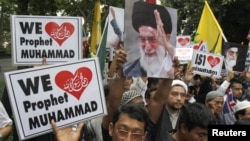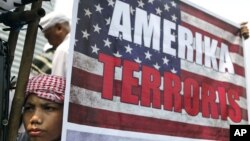Hundreds of protesters rioting against an anti-Islam film torched a press club and a government building Monday in northwest Pakistan, sparking clashes with police that left at least one person dead.
Demonstrations also turned violent outside a U.S. military base in Afghanistan and at the U.S. Embassy in Indonesia. Meanwhile, the leader of the Shi'ite militant group Hezbollah called for sustained protests in a rare public appearance before thousands of supporters at a rally in the Lebanese capital, Beirut.
Sheikh Hassan Nasrallah accused U.S. spy agencies of being behind events that have unleashed a wave of anti-Western sentiment in the Muslim and Arab world.
The protests followed demonstrations and violence in about 20 countries since last Tuesday when the American ambassador in Libya and three of his staff were killed in an attack on the U.S. consulate in Benghazi as protests spread from neighboring Egypt.
Monday's protests in Pakistan's Upper Dir district, in the country's northwest Khyber Pakhtunkhwa province, involved about 800 people. Other violent demonstrations also broke out in Karachi, Pakistan's commercial hub, and in Lahore, where protesters threw rocks at police and burned an American flag near the U.S. consulate.
Pakistani Prime Minister Raja Pervez Ashraf ordered YouTube blocked in the country so the "blasphemous" film could not be viewed after the video-sharing website refused to remove the video.
In Afghanistan, hundreds of demonstrators burned tires and shipping containers while throwing stones at police and buildings in the capital, Kabul - the first significant violence in that country over a crude, American-made film that mocks the Prophet Muhammad. Protesters shouted "Death to America" and burned U.S. and Israeli flags. At least two police cars were set ablaze.
About 50 Afghan policemen sustained light injuries attempting to quell the violence, but commanders said they eventually managed to control the crowd. A number of Afghan elders and religious leaders urged calm.
In Jakarta, hundreds of Indonesians angered over the film clashed with police outside the U.S. Embassy, hurling rocks and firebombs, and setting tires alight outside the mission. Protesters there also burned U.S. flags and a picture of U.S. President Barack Obama. The actions marked the first significant violence seen in the world's largest Muslim-majority country since international outrage over the film exploded last week.
Also Monday, a hardline Tunisian Salafist leader escaped from a mosque that had been surrounded by security forces seeking to arrest him over clashes at the U.S. Embassy last week. Seif-Allah Ben Hassine, leader of the Tunisian branch of the Islamist Ansar al-Sharia, slipped away after hundreds of his followers stormed out of al-Fatah mosque in the capital, Tunis.
Western embassies in central Kabul, including the U.S. and British missions, were placed on lockdown and violence flared near fortified housing compounds for foreign workers. Rallies also took place Sunday in London, Australia, Turkey and Pakistan, showing the global scale of the outrage.
Washington has sent ships, extra troops and special forces to protect U.S. interests and citizens in the Middle East, while a number of its embassies have evacuated staff and are on high alert for trouble.
The U.S. says it will close its embassy in Bangkok on Tuesday because of a large planned demonstration against the film.
Iranian officials said Monday they would hunt down those responsible for making the video. The low-budget film, The Innocence of Muslims, depicts the Prophet Muhammad as a fraud, a womanizer and a child molester, among other overtly insulting claims.
The man who allegedly is behind the obscure, private film was questioned Saturday by U.S. authorities in California.
Demonstrations also turned violent outside a U.S. military base in Afghanistan and at the U.S. Embassy in Indonesia. Meanwhile, the leader of the Shi'ite militant group Hezbollah called for sustained protests in a rare public appearance before thousands of supporters at a rally in the Lebanese capital, Beirut.
Sheikh Hassan Nasrallah accused U.S. spy agencies of being behind events that have unleashed a wave of anti-Western sentiment in the Muslim and Arab world.
The protests followed demonstrations and violence in about 20 countries since last Tuesday when the American ambassador in Libya and three of his staff were killed in an attack on the U.S. consulate in Benghazi as protests spread from neighboring Egypt.
Monday's protests in Pakistan's Upper Dir district, in the country's northwest Khyber Pakhtunkhwa province, involved about 800 people. Other violent demonstrations also broke out in Karachi, Pakistan's commercial hub, and in Lahore, where protesters threw rocks at police and burned an American flag near the U.S. consulate.
Pakistani Prime Minister Raja Pervez Ashraf ordered YouTube blocked in the country so the "blasphemous" film could not be viewed after the video-sharing website refused to remove the video.
In Afghanistan, hundreds of demonstrators burned tires and shipping containers while throwing stones at police and buildings in the capital, Kabul - the first significant violence in that country over a crude, American-made film that mocks the Prophet Muhammad. Protesters shouted "Death to America" and burned U.S. and Israeli flags. At least two police cars were set ablaze.
Anti-U.S. Protests Timeline
Anti-U.S. Protests Timeline:- September 11: Protesters attack U.S. embassy in Cairo, Egypt and U.S. Consulate in Benghazi, Libya. U.S. Ambassador to Libya Chris Stevens and three other Americas are killed
- September 12: Anti-U.S. protests spread to several Arab countries.
- September 13: Protesters storm U.S. embassy compound in Sana'a, Yemen
- September 14: Protests spread further across Africa, Asia and the Middle East
- September 15: US orders non-essential personnel and families of diplomats out of Tunisia and Sudan
- September 16: A protester dies during a clash with police in Pakistan
- September 17: A protester dies during a clash with police in Pakistan
In Jakarta, hundreds of Indonesians angered over the film clashed with police outside the U.S. Embassy, hurling rocks and firebombs, and setting tires alight outside the mission. Protesters there also burned U.S. flags and a picture of U.S. President Barack Obama. The actions marked the first significant violence seen in the world's largest Muslim-majority country since international outrage over the film exploded last week.
Also Monday, a hardline Tunisian Salafist leader escaped from a mosque that had been surrounded by security forces seeking to arrest him over clashes at the U.S. Embassy last week. Seif-Allah Ben Hassine, leader of the Tunisian branch of the Islamist Ansar al-Sharia, slipped away after hundreds of his followers stormed out of al-Fatah mosque in the capital, Tunis.
Western embassies in central Kabul, including the U.S. and British missions, were placed on lockdown and violence flared near fortified housing compounds for foreign workers. Rallies also took place Sunday in London, Australia, Turkey and Pakistan, showing the global scale of the outrage.
Washington has sent ships, extra troops and special forces to protect U.S. interests and citizens in the Middle East, while a number of its embassies have evacuated staff and are on high alert for trouble.
The U.S. says it will close its embassy in Bangkok on Tuesday because of a large planned demonstration against the film.
Iranian officials said Monday they would hunt down those responsible for making the video. The low-budget film, The Innocence of Muslims, depicts the Prophet Muhammad as a fraud, a womanizer and a child molester, among other overtly insulting claims.
The man who allegedly is behind the obscure, private film was questioned Saturday by U.S. authorities in California.






